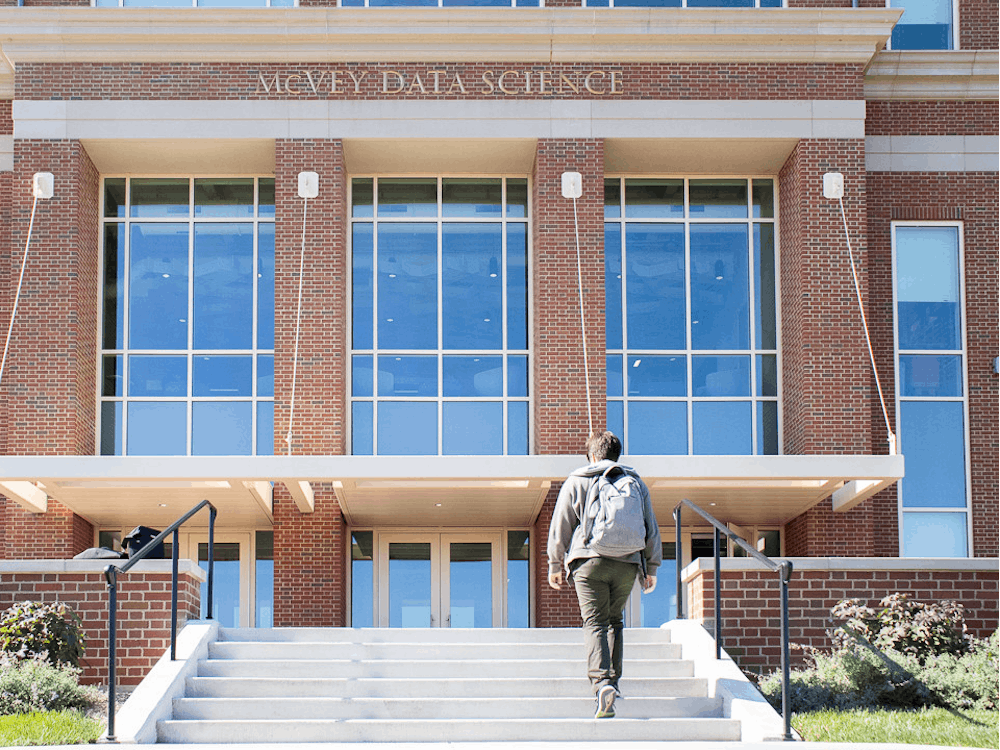Miami University’s Climate Action Task Force has gotten to work, launching several initiatives that begin the progress of reducing greenhouse gas emissions and achieving carbon neutrality.
Several initiatives including a required student sustainability module, electrification of university vehicles, a carbon footprint dashboard, a solar study, a net-zero study and a resilience study, which looks at how Oxford and Miami are prepared to adapt to the impacts of climate change, have already begun or are in the works.
The Resilience Assessment Report, net-zero study and solar study will inform the task force about Oxford’s potential climate changes, the state of the university’s energy use and the possibility of adding a solar power field, respectively. These studies will create the foundation for Miami’s Climate Action Plan, one component of the PCLC.
President Greg Crawford signed the Presidents’ Climate Leadership Commitment (PCLC) on Sept. 22, 2020, which includes a timeline for universities to follow.
The PCLC outlines dates for Miami’s resilience assessment, which must be complete by September 2022, and the comprehensive Climate Action Plan for achieving carbon neutrality, which must be completed by September 2023.
The task force submitted its first baseline report to Second Nature, the creator of the PCLC, this past Friday, April 30, and reported Miami’s carbon footprint in 2019 based on Metric Tons of Carbon Dioxide Equivalent (MTCO2e). Miami’s two largest emission sources were purchased electricity and natural gas sources burned on-site (85.51% of the total MTCO2e emissions). These numbers are down 52% from 2008.
Task force co-chairs Jonathan Levy, director of the Institute for Environment and Sustainability, and Adam Sizemore, director of sustainability, said the Climate Action Plan is mainly about mitigation of reducing carbon emissions.
Sizemore said the target date to execute the Climate Action Plan is May 2024 and the Resilience Assessment Report is May 2023.
“The first step [in the resilience study] is figuring out how the climate is really going to change here, and that’s actually not easy,” Levy said. “There’s a lot of information out there that is not driven by data to a large extent, so it's going to take someone to really dig into the data to see how climate has been changing and see what they’re predicting.”
Levy said some of the main guesses for climate impact in Oxford are that it's going to get hotter, there will be increased flooding, more frequent storm events and also more frequent droughts, but the Resilience Assessment Report will report research-based projections when it is complete.
Levy said these projections introduce health implications for those with lung problems and introduce questions about infrastructure, water supplies, food security, ecosystem damage and diversity and inclusion with access to resources.
The task force is divided into three subgroups: carbon neutrality, climate resilience and campus/community involvement and engagement. Within these subgroups, there are subcommittees that work under the task force executive steering committee - the heads of all the subcommittees. All members of the task force work on the Climate Action Plan, and the climate resilience subgroup is working on the Resilience Assessment Report.
Enjoy what you're reading?
Signup for our newsletter
“We're working backwards on goals [and] we're meeting with the task force again for a second time this month in a couple weeks,” Sizemore said. “We really spent this spring semester letting individuals of the task force come up with their own specific goals.”
Sizemore said their master plan, which includes energy transformation and carbon reduction details, is planned out until 2026.
“We're really doing our due diligence to make sure that our date for carbon neutrality is as accurate as we can get it and is doable,” Sizemore said. “We'll be able to have that Climate Action Plan directly before [2026] moving forward, so in the meantime, a lot of initiatives with our energy systems will still continue to happen.”
Denali Selent, sophomore chemical, paper and biomedical engineering major, is the student representative on the executive steering committee for the task force. She said this year has been used mainly to get acclimated to the goals of the task force and learn more about the PCLC.
Selent said her role consisted of setting up a subcommittee for student engagement and brainstorming initiatives to begin this fall.
“I'm super pumped to really dive into the planning process this summer, and can't wait to get into the more implementation stages of that,” Selent said. “I've been really trying to find ways and brainstorm ways to help connect [or] to form a bridge between what the taskforce is doing and what students know about what's going on, because I want students to be involved every step of the way and informed every step of the way.”
Selent said one of her projects includes setting up a form on the sustainability website where students can ask questions and voice concerns about the progress and work of the task force.
In meetings with the rest of the task force, Selent said her main focus is communication with the student body.
“When I go to the task force meetings I want to represent the student body, and when students voice concerns and things to me, I want to communicate those with the other members of the task force,” Selent said. “I want it to really be a part of campus life and a part of conversations on campus.”
Selent said she felt the task force has made a lot of individual progress this academic year.
“We're kind of more so in the preliminary stages, a little bit more like setting up the logistics, setting up the organization of the task force since it is very, very new and kind of trial and error of seeing what things work best,” Selent said. “So definitely more in the coming semesters, it will get a little bit more into the nitty gritty of solution-based [projects], but I would say more of the focus this semester has been really just getting the taskforce up and running.”
Alexandria Coffman, a sophomore urban and regional planning major with a sustainability co-major, is the incoming president of EcoReps this fall.
Coffman said she hopes the task force will seek student input and understand what students want to see in terms of carbon neutrality.
“I think that students on Miami’s campus have a lot of great ideas when it comes to sustainability,” Coffman said. “I think the goal of carbon neutrality is a great goal for the university to have, [and] Miami [has] already taken a lot of great steps. I’m excited that the PCLC is building on the progress that’s already been made.”
Levy and Sizemore will be working over the summer to continue the work that has been done this year.




